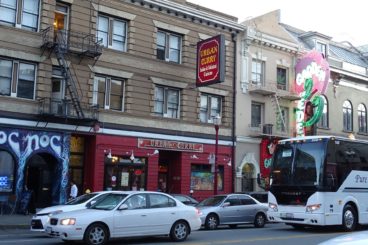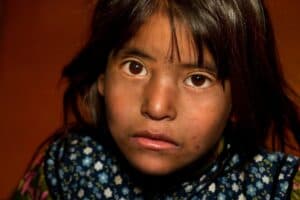Asian American Christian Undocumented Residents Overcoming Barriers

“I used to bus from work to UCLA and it would take two hours each way. That’s the whole day on the bus. And late at night, I’d be scared waiting at the bus stop alone.”
On the condition of anonymity, Ji Lie shared about the barriers she faced as an undocumented Asian in Los Angeles. Just to survive, she spent four hours daily taking public transit because she couldn’t secure a California driver’s license.
Ji Lie’s grandmother brought her to the United States at the age of twelve, so that she could gain more opportunities than her parents could provide in Taiwan. Without any choice in the matter Ji Lie was told only that she “was going to study and stay here.” Since it was her grandmother’s dream that she graduate from college, she worked hard to finish what her grandmother started.
Along the way, her grandmother warned her not to tell anyone about her status. “She was afraid that others would take advantage of me,” Ji Lie recalled. Those fears were quite founded. Ji Lie could be exploited at work, or even trafficked under the threat of deportation. Initially, Ji Lie was functionally deaf and mute in American society because of her lack of English. She was also kept from obtaining a driver’s license, barred from a decent, minimum wage job, and blocked from utilizing the education she worked so hard to attain. Her dreams for the future—and her grandmother’s dreams—were foreclosed.
The issues that Ji Lie encountered as she grew up are horrific enough, but they are just some of the obstacles facing the 1.5 million unauthorized Asians in the United States. These individuals—whose numbers have tripled since 2000—have also faced community stigma and structural barriers that are even more damaging.
Despite being labeled “illegal” and the corresponding walls that confine her, Ji Lie knows that her identity is more than being undocumented and that her future is still filled with possibilities. Her own life is testimony to her belief that “Jesus came to break down barriers.”
Community Stigma and Freedom in Christ
The day-to-day barriers that Ji Lie confronted were difficult, but the isolation and shame that she experienced posed even greater challenges for her. Although one in seven Asians in the United States do not have legal status, large portions of their own ethnic communities do not think that undocumented individuals belong here. Four out of ten Asian Americans do not believe that the undocumented deserve a path to citizenship, even though Asia is now the fastest-growing source for unauthorized persons in the US.
These Asian Americans may be unaware that because of the racist Chinese Exclusion Act of 1882, at least 25 percent of the Chinese American population in 1950 were unlawfully present in the United States. They came as paper sons and daughters, using fraudulent documents and claiming to be the children of American citizens.
This political opinion, compounded with a cultural orientation towards maintaining face, heightened the shame that Ji Lie experienced in high school. Attending public school, Ji Lie felt marginalized because she couldn’t join in conversations with the other students. She explained, “I’m not like the average American kid. They’d talk about getting their driver’s licenses, getting a car. I’d have to change the topic, and quickly dismiss the conversation.”
She began going to a Taiwanese church, but there, too, people didn’t understand her situation. Ji Lie said that she was the first undocumented person whom her pastor had ever met. Consequently, “I had a sense of embarrassment that people would look down on me because I didn’t have legal status.”
Ji Lie couldn’t confide in her grandmother, even though they were close, because her grandmother didn’t understand the life of American teens. The shame and isolation affected her mental health, as she explained: “I felt I didn’t belong here and I was very ashamed while in high school. The shame put a toll on my emotional health and made me depressed.”
Over time, Ji Lie felt that she “couldn’t hide it anymore,” and shared her status with a pastor and a few Christian friends. Although they weren’t able to fix her problem, they became her emotional support and role models of faith.
“Why are these things happening? How do I get strength and hope?” Ji Lie asked herself. Her pastor and an older sister in Christ counseled her that her identity was in Christ, not in her undocumented status. As she grew in that identity, she found freedom from her isolation and hope for the future.
Her identity was in Christ, not in her undocumented status.
She summarized, “For me, undocumented status during high school was an identity issue for me, my identity crisis. When I started learning about God, it helped to remind me that my identity in Christ wasn’t defined by my immigration status. I’m worthy, my concerns are valid, and my being—as a human being—is deeper than any existing issue of status.”
Likewise, Grace, who came to the United States with her Korean parents when she was just eight months old, shared that her status made her mistrust others. Her parents, who overstayed their tourist visas, were adamant that she not tell others about her citizenship.
Consequently, Grace became fearful of all authorities—police, teachers, school counselors—who were supposed to serve and protect her. As she said, “I didn’t feel comfortable asking for help because I felt so fearful of being found out and being deported. That was a major barrier.”
In much the the same way, as Ji Lie, Grace found a new identity through becoming a Christian during college. She recalled, “Before, my status loomed large and impacted every aspect of life—my school, work, friends. It affected if I could open up, how I felt with others, or if I even belonged anywhere. I was feeling lonely even though I was around lots of people.”
In contrast, becoming a Christian provided Grace with a community. She continued, “In church, I found a lot of people that I could trust. I found not rejection, not fear, not people who would run to the authorities, but a community that I can trust. And through that, I found a lot of healing.”
Structural Barriers and Jesus’ Work of Reconciliation
Given the attitudes toward undocumented individuals within Asian communities, as well as the strong evangelical support for the current administration’s immigration policies that affect Asian Americans, some may counter, “Ji Lie and Grace are still illegal. They should obey the law, go to the back of the line of those waiting for visas, and become Americans through the right procedures.”
Grace understands this position, that the immigration system is unfair to those who must wait such a long time to enter the United States. Yet she notes that the system is also unfair to people like herself, who came to the U.S. as young children and identify as Americans. Since both groups face political obstacles to equal opportunity, she recommends, “We need to fix our immigration system as a whole. It’s not fair to ask me to ‘go back,’ when Korea’s not really my home.”
Similarly, when Ji Lie and her grandmother found themselves blocked by economic and legal hurdles, she reported that they “looked at all different options.” Her grandmother considered adopting her, but retaining good legal counsel was too costly for their family. Ji Lie sought status to obtain an international student visa, but she didn’t meet the requirements. If her grandmother petitioned her father to gain permanent residency, and then if he petitioned for Ji Lie to join him, that entire process would take over twenty-five years. By that time, Ji Lie wouldn’t need to come to the United States for her education.
We are all immigrants, and children of immigrants—with the same dreams and hopes.
Grace and Ji Lie’s families didn’t have the contacts or resources to enter the United States legally, but those with more wealth do. The United States privileges individuals with educated and professional backgrounds for visas; Ji Lie and Grace are the first in their families to ever attend college and so their families couldn’t enter through a “merit” visa. Those who can hire attorneys might be able to secure temporary visas for their own children. And capitalists who invest $1 million and create ten jobs can promptly obtain an EB-5 visa, also known as the “million dollar green card.”
The different opportunities that the wealthy have to become “legal,” as compared to what poor and working class Asians have, are stark. Even though both the rich and the poor share the American dream, only a few are afforded legal avenues to pursue it. Thus, even though these immigration policies may be enacted by law, they remain unfair and unjust.
Unfortunately, class barriers also lead to residential segregation and relatedly, they lead to different opinions about the issue of illegal immigration. Within the Asian American community, economic classes divide as the rich live in gated ethnoburbs, such as San Marino, while the poor have to live in substandard housing in ethnic ghettos like Chinatowns. Without personal understanding of the daily barriers and constant shame that the undocumented live with, educated and professional Asian Americans more easily take the hard stand against illegal immigration.
Grace suggests if others got to know unauthorized persons, they would develop more compassion on this issue. Her roommate is a Christian with a politically conservative outlook and who originally planned to vote for Trump. “All I could do is share my own story,” Grace explained, as she discussed politics with her friend.
“To put harsh consequences on people like me who just ended up here, it’s unfair. I don’t know if I changed her mind or not, but she did end up voting for Hillary Clinton.”
In similar fashion, Ji Lie’s pastor got to know her well, and came to empathize with her difficult circumstances. Through this relationship, he has changed his own political stance on immigration policies. Ji Lie believes, “If people got to know the undocumented as real persons like themselves, they would realize that we’re all the same. We are all immigrants, and children of immigrants—with the same dreams and hopes.”
Jesus: Breaking Down Barriers
Through their study of Scripture, both Ji Lie and Grace have come to see how their faith has helped them overcome each of these walls in their own lives. Ji Lie explained, “What Jesus did was revolutionary! He broke down barriers and boundaries, not how we see today in politicians wanting to build walls.” Indeed, Jesus did break down each of the barriers that both women faced.
In dealing with the identity crisis caused by the issues she experienced in high school, Ji Lie found that Christianity offered her a new status. She testified, “Jesus wouldn’t see me different from everyone else. He’s for people in need.”
Grace noted as well, “I know that wherever I end up—even in the worst case scenario, if I get deported— I still have people in the church who love me. It helps me understand my status is not the source of identity.”
Their walls of shame and stigma met from the broader community were overcome by Jesus’ work of reconciliation within their own church communities. Speaking of the support she received from her church, Ji Lie observed, “My pastor was someone with whom I felt I was very safe. I also told an older sister in Christ. They had a lot of empathy for my situation.” Rather than ostracizing her, her church family embraced her.
“My church is very supportive of me. They’re always asking if I’m worried, if I have fear after Trump was elected, and they ask for my prayer requests,” Grace enthused. Through this community, she claims, “I have much more peace now,” both with others and within herself.
Finally, Ji Lie and Grace see Jesus removing even the deeply embedded, structural barriers that have impeded their lives—the legal obstacles preventing them from getting visas, the financial costs to get documentation, and the class segregation that fosters anti-immigrant attitudes. Through President Obama’s DACA policy, Ji Lie and Grace have finally been able to get driver’s licenses, obtain their college degrees, and enter the workforce. Grace works for a healthcare corporation where she hopes to advance, while Ji Lie plans for a career where she can pursue God’s social justice and break down barriers for others
Ji Lie concluded, “The system and its policies make it harder for some people to navigate than others. Jesus came to break down these walls, too.”
President Trump may want to build a wall against unauthorized residents, but Ji Lie and Grace’s narratives demonstrate God’s continuing work of salvation and reconciliation. Jesus came to break down unauthorized walls facing the shamed and the isolated, as well as the walls between the documented and the undocumented. As Paul wrote, “He Himself is our peace, who has made the two groups one and has destroyed the barrier, the dividing wall of hostility.” (Ephesians 2:14)
Russell Jeung is Professor of Asian American Studies at SF State University. His memoir, At Home in Exile: Finding Jesus Among My Ancestors and Refugee Neighbors (Zondervan 2016), shares stories of his grandfather who was undocumented, as well as Jeung’s ministry among refugees and unauthorized persons in East Oakland.


